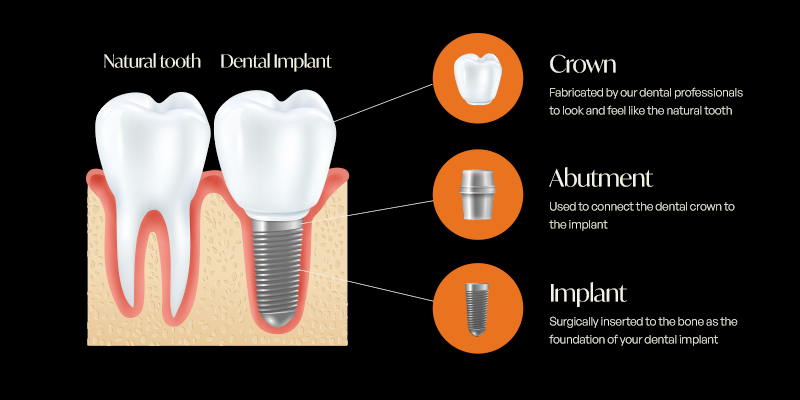Book an appointment
or ask a question
Leave your details here and a member of our team will be in touch momentarily.
What happens if I don’t replace a missing tooth?
If patients leave a missing tooth untreated, ultimately leaving an open gap in the mouth, it can cause neighbouring teeth to shift out of position and the surrounding teeth and jaw may also begin to deteriorate, which can lead to a number of dental problems.
It also poses the risk of trapping bacteria and debris in this gap which can lead to decay in the surrounding teeth or result in gum disease.
Dental implants are a great way to replace missing teeth and prevent these problems from occurring. As the saying goes, “Prevention is better than a cure.”
What are the benefits of dental implants?
Dental implants can offer numerous benefits for patients. While the aesthetic benefits of dental implants may be self-evident for some, dental implants are not just limited to aesthetic benefits.
The benefits can be divided into three categories: aesthetic benefits, functional benefits and overall health benefits.
Aesthetic Benefits
- Dental implants do not look fake and are, in fact, aesthetically appealing.
- Once placed, they will look and feel just like a natural tooth.
Functional Benefits
- Dental implants can ultimately eliminate distasteful and sticky temporary denture adhesives.
- They will not only look natural but the function of your natural tooth will be virtually restored through the dental implant.
- Dental implants assist in maintaining your jaw and bone structure which ultimately supports your facial tissues and structure.
- By utilising dental implants to replace a missing tooth, you can reduce or virtually eliminate bone atrophy. Bone atrophy results in a sunken look and facial changes including premature ageing, which can lead to cosmetic concerns later on.
- Dental implants will keep all the teeth adjacent stable and prevent any shifting if addressed soon enough.
Health & Lifestyle Benefits
- Dental implants can be beneficial to your diet, as you can now return to eating the foods you weren’t able to eat without teeth.
- Unlike temporary dentures or other restorative alternatives that will require replacements later in life, dental implants have lifetime longevity, if the patient sustains optimal oral health and keeps up with the maintenance instructions and treatments required.
- A missing tooth gap can trap bacteria, food and hard-to-reach debris which can lead to gum disease. Once placed, dental implants will reduce the risk of this.
- Dental implants are a great alternative for patients who have previously had poor-quality dentures that have caused irritation or oral sores in the mouth.
Dental Implant FAQs
The wisdom tooth site is not one that Dr Jaclyn Wong would replace. As Dr Wong explains: “This is because in most cases, patients aren’t able to maintain or properly clean wisdom teeth, because they are so far back in the mouth and they can’t floss and brush them appropriately. So we would never consider replacing those teeth.” They are also not important for function.
Generally speaking, depending on the type of implant used they can last between 15 to 25 years. If you have healthy gums and bones, dental implants can last a lifetime.
However, this does depend on several factors including your oral status, the state of bone density of the upper jaw (maxilla) or lower jaw (mandible), whether there’s adequate gum health around the implant site, whether a smoker or grinder and so on.
Your eligibility for dental implants will depend largely on your health. This includes factors such as whether or not you have gum disease, and if there’s adequate jawbone volume and density to place the dental implant.
The best way to find out if you’re eligible for implant dentistry is to contact Dr Wong for a consultation.
It is extremely rare for dental implants to fall out.
In fact, a dental implant is designed to fuse with the jawbone and become a permanent fixture. When the implant has been surgically implanted into the jawbone, it heals and fuses with the bone over a period of a few months.
This process is known as osseointegration and ensures that the implant stays secured in the mouth. Once an implant has fused with the jawbone, it should feel secure, just like a natural tooth.
Yes, however, you will want to have your dentist confirm your eligibility before trying to move forward with any treatments. This will also ensure a safer treatment.
Many elderly patients actually benefit from dental implants if they have previously worn poor-quality dentures in the past and have experienced pain, discomfort or gum irritation from them.
If you are considering dental implants, book your consultation with Dr Jaclyn Wong to determine your candidacy for the procedure. This will also include checking your overall health and wellbeing and your jawbone structure and health.
As per the Australian Dental Association, it is important to preserve the space left by a missing tooth for several reasons. A considerable gap between teeth can impact a person’s ability to chew or speak properly. Adjacent teeth may become mobile and shift positions, while bone loss around the area of the missing tooth can also occur.
The procedure of dental implant surgery is considered one of the safest in dentistry, and it stands out as the sole method of restoration that encourages the growth of natural bone beneath the area of a missing tooth.
The process of dental implant integration can take anywhere from a couple of months to several months. This is because the bone surrounding the newly placed implant requires sufficient time to heal and fuse with the implant to provide a secure and stable foundation.
Several alternatives to dental implants exist, depending on individual circumstances and preferences. Dental bridges, both traditional and resin-bonded (Maryland bridges), are fixed prosthetic options that anchor artificial teeth to adjacent natural teeth, offering stability and aesthetics but requiring the preparation of neighbouring teeth. Removable partial dentures and complete dentures are removable options suitable for replacing multiple or all missing teeth, respectively, though they may not offer the same stability or chewing efficiency as implants. Orthodontic treatments such as space maintainers can be used in younger patients to preserve space and prevent adjacent teeth from shifting after premature tooth loss. Each alternative has its benefits and considerations, and the choice should be made based on consultation with a dental professional to ensure the most suitable solution for individual needs.
To care for dental implants effectively, maintain meticulous oral hygiene by brushing with a soft-bristled toothbrush and non-abrasive toothpaste at least twice daily, ensuring cleaning around the implant and adjacent teeth with interdental brushes or floss threaders. Regular dental check-ups every 6 months are crucial for professional cleaning, assessment of implant health, and early detection of any issues. Avoid chewing hard objects to prevent damage, quit smoking to promote healing and reduce implant failure risks, and promptly report any signs of discomfort, swelling, or redness around the implant site to your dentist. Following post-operative care instructions if your dental implants were recently implanted is essential for optimal healing and the long-term success of your implants.
During the dental implant procedure, most patients experience minimal discomfort, which is typically managed with local anaesthesia to numb the surgical area. After the procedure, some mild soreness or discomfort can be expected, similar to having a tooth extracted. However, this discomfort can usually be managed with over-the-counter pain medications prescribed by your dentist. Overall, while there may be some discomfort associated with the implant process, it is generally well-tolerated by patients.
Dental Implants in Melbourne
If you would like to know more about implant dentistry or to request an appointment, please contact us today.

